Organizing a coaching workshop is the perfect way to transfer the essential skills and methodologies you have expertise in to other people. These condensed, interactive events create the space for continuous learning and networking with fellow coaches.
If you’re ready to build your personal brand and expand your services with workshops, read on to find out how to create and sell one, including:
- What is a coaching workshop?
- How do you structure a coaching workshop?
- Coaching workshop ideas
- How to promote your coaching workshop
What is a Coaching Workshop?
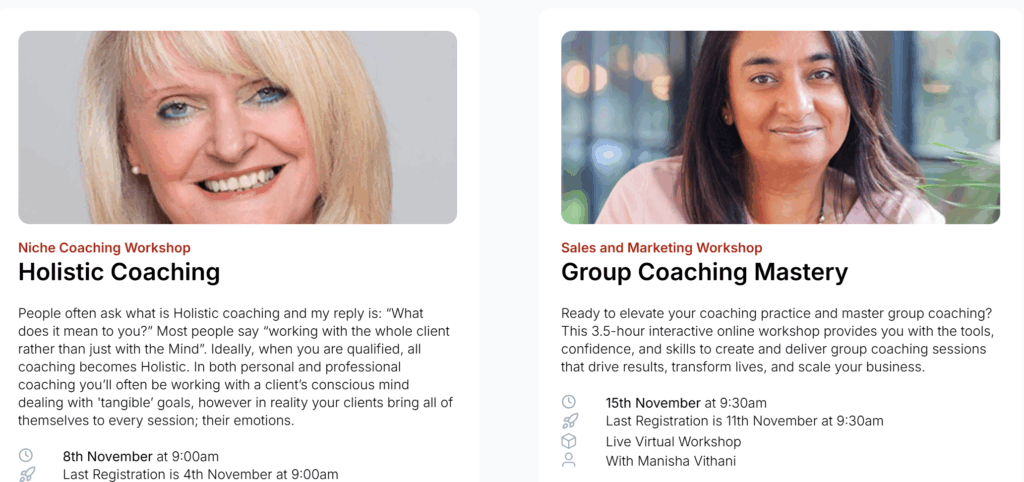
A coaching workshop is a structured, interactive event around a specific theme. It provides insights into essential skills, techniques, methodologies, and best practices surrounding your chosen topic.
Coaching workshops are usually facilitated by experienced coaches or industry experts online or in person and span anywhere from a few hours to a few days. They are a mixture of the following:
- Lectures explaining coaching principles and case studies
- Interactive activities like group discussions or practical coaching exercises
- Networking opportunities in case of in-person events, particularly multi-day retreats
Coach workshops are great opportunities to:
- Build your authority in your coaching niche
- Create rapport with attendees and upsell people into your signature coaching program
- Enlighten potential clients into your coaching process to build rapport and trust
Pro tip: The best way to promote, sell, and deliver a coaching workshop is to use Paperbell. Try it for free to start selling your workshop with a stunning website integrated with payment processing, email automations, and more.
How Do You Structure a Coaching Workshop?
You don’t have to follow a cookie-cutter formula when structuring your workshop. However, there are some common elements most coaching workshops incorporate to keep participants engaged and effectively facilitate learning.
Here’s a workshop template you can follow to plan your next event:
1. Introduction and Expectation Setting
Open your workshop by introducing yourself and the other facilitators of your event to build rapport and credibility. Then, provide some context about the event’s main theme, purpose, why it’s important, and key learning outcomes.
This is also an excellent time to:
- Give your audience a breakdown of the event agenda
- Share some essential information, such as when breaks will be held
- Introduce agreements to the group to create a safe space for workshops with more sensitive themes, such as refraining from judgment
This is an important step, regardless of whether your workshop is in person or hosted as a virtual meeting.
2. Getting to Know the Group
The participants of your workshop probably don’t know each other. If the group is small, you can go around in a circle and let everyone introduce themselves. This may be as simple as sharing:
- Their name and background
- Why they joined the workshop
- Where they’re located (if this is a virtual workshop)
Optionally, you can also ask your participants to tell fun facts about themselves, like what they wanted to be as children when they grew up, or play a short icebreaker activity with them.
These early activities help create trust between them for more intimate, small-group workshops so they will feel more comfortable sharing about themselves later on.
[ Read: How to Offer Group Coaching: The Everything You Need To Know Guide ]
3. Presenting Key Concepts
Your first lecture should provide an understanding of your workshop’s main concepts. Are you organizing a more extensive event? Create a clear structure and flow for the principles and methodologies you’re presenting so they build on each other.
Breaking up your lectures with visual aids and questions for your participants will help them stay engaged. They’ll also retain more of the information shared with them. This is especially true if your workshop is virtual.
Real-life case studies are also great ways to illustrate the practical application of the coaching process or tools you teach.
[ Read: The Five Go-To Coaching Models To Use with Your Clients ]
Make sure you always allocate time for questions before moving on to the next section of your workshop. This is so participants can seek clarification on the topics covered during your session.
4. Interactive Exercises
Group exercises are the heart of live workshops. They immediately demonstrate to your participants how to incorporate the skills they’ve just learned. It also allows them to learn from not only you but also their peers.
Workshop exercises may include role-plays and testing out what they’ve learned in groups of two to three people. However, depending on the topic, solo breakout times may be better.
For example, let’s say you’re a coach training people in specific coaching skills. One participant may play the coach, the second one the coachee, and the third one can be the observer.
But what if you’re coaching your attendees on how to handle copywriting for their website? Then, this time would be better used solo to develop some copy to get your feedback right after.
Breakout sessions are also a great way to create space for sharing insights within groups of 3-5 people.
Alternating short lectures and practical exercises is the most effective way to teach multiple concepts within a short time frame.
5. Reflection
Reflecting on recent learning is an essential element of retaining and integrating information. You can do this with the following:
- Writing prompts for individual reflection
- Small sharing circles to discuss key takeaways and brainstorm ways to implement concepts
- A final Q&A where you can answer questions and provide constructive feedback to your attendees
Reflection will help your participants walk away feeling complete and ready to use the content of your workshop in real-life scenarios.
6. Closing
Your final session should briefly summarize the key topics of your workshop once again. It should also lay out a few next steps your attendees can take to incorporate them into their lives or businesses.
Thank them for participating and tell them where they can follow or contact you online. Your final workshop session is also an excellent opportunity to share a little about your coaching packages or course for further learning.
48 Coaching Workshop Ideas
It’s best to define your workshop idea based on the biggest pain point your target audience faces.
Here are some examples of workshops in different niches, including for other coaches and non-coach individuals. You can also use these ideas for your online courses and other materials you want to sell on your coaching store later.
Life Coaching Workshop Ideas
For other coaches:
- Vision Board Creation Workshop: Learn how to facilitate vision board exercises to help clients envision their goals and aspirations.
- Values Clarification Session: Explore techniques to help clients identify their core values and align with them for greater fulfillment in life.
- Goal Setting and Action Planning Seminar: Learn to facilitate SMART goal-setting with actionable plans.
For individuals:
- Design Your Dream Life Vision Workshop: Create a powerful vision board and clarify your aspirations across all life areas.
- Core Values Discovery Session: Identify your personal values and learn practical strategies to live in alignment with them.
- New Year, New You Goal-Setting Intensive: Set meaningful SMART goals and create a concrete 90-day action plan to achieve them.
Below is an example of a goal-setting workshop by Jennifer Lovemore:
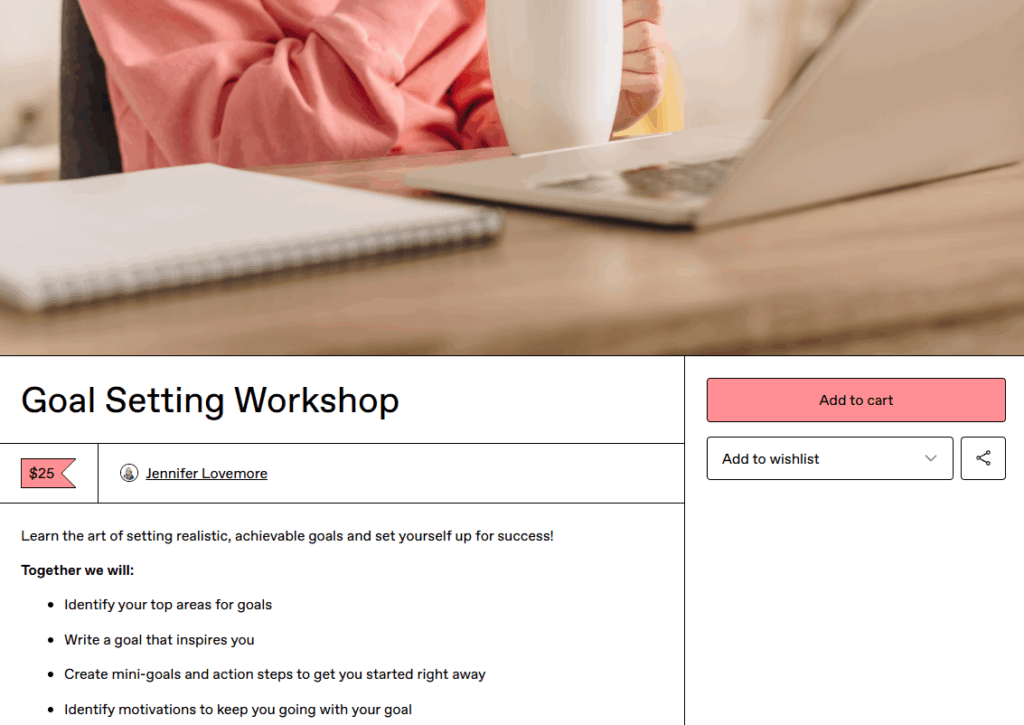
What’s great about goal-setting workshops is that you can easily upsell attendees into a coaching package to help them achieve the goals they’ve just set.
Career Coach Workshop Ideas
For other coaches:
- Personal Branding Workshop: Help your clients define and communicate their unique value proposition to advance their careers.
- Networking Mastery Training: Learn proven networking techniques and relationship-building strategies to help clients expand their professional networks.
- Career Transition Coaching Intensive: Learn how to guide clients through career transitions like job changes, promotions, or entrepreneurial ventures.
For individuals:
- Career Launch Workshop: Create a specific and actionable plan to launch a brand new career.
- Career Transition Workshop: Learn how to build the skills, resume, and network necessary to make a meaningful career transition.
- Career Upskill Intensive: Find opportunities to upskill yourself as a worker and find new career growth opportunities.
Brite Launch’s 4-Week Career Launch Workshop is a great example of the above.
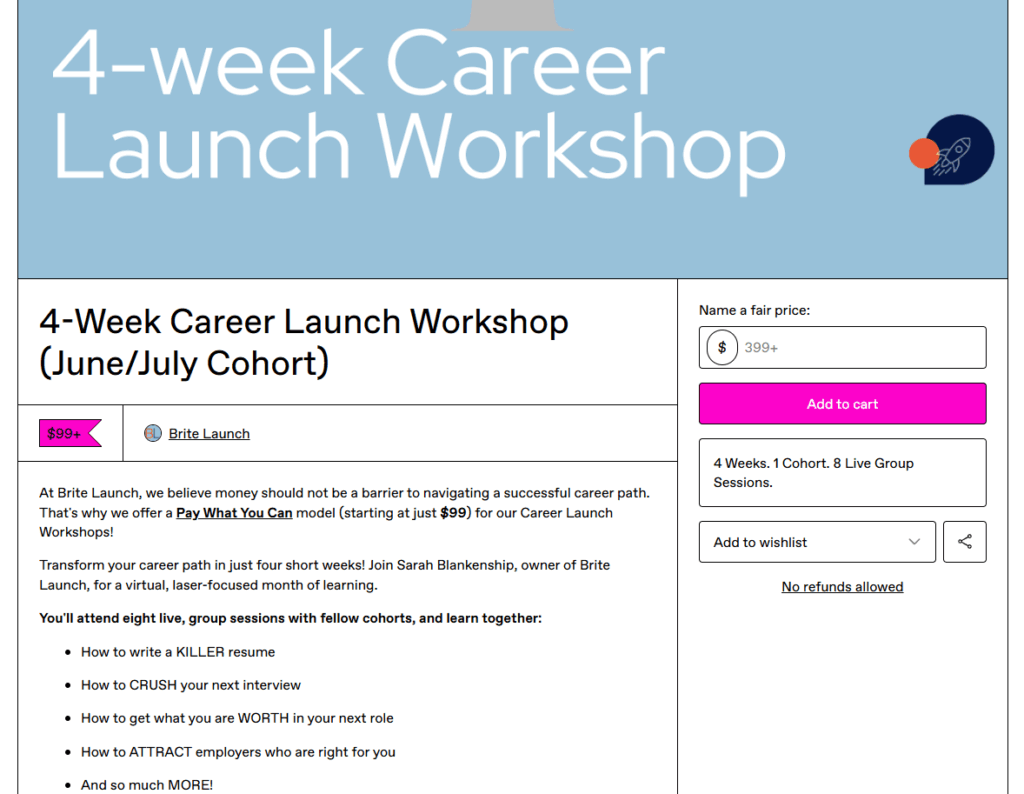
Business Coaching Workshop Ideas
For other coaches:
- Business Coaching Fundamentals Training: Master core business coaching frameworks, including strategic planning, financial literacy coaching, and growth strategy development.
- Scaling Small Businesses Coaching Workshop: Learn methodologies and coaching conversations to help entrepreneurial clients scale from small businesses to sustainable businesses with teams.
- Business Model Innovation Coaching: Discover how to guide clients through pivoting, diversifying revenue streams, and adapting to market changes.
For individuals:
- Launch Your Business Blueprint Workshop: Develop a comprehensive business plan with validated ideas, target market research, and a 6-month launch roadmap.
- Revenue Growth Accelerator Intensive: Identify untapped revenue opportunities in your existing business and create actionable strategies to increase profitability.
- Business Systems and Automation Workshop: Streamline your business operations by implementing systems and automations that free up your time for strategic growth.
Wake Up To Freedom’s Beyond Thanks workshop is a great example of a revenue growth workshop. They help attendees create new streams of income via simple Thank You pages.
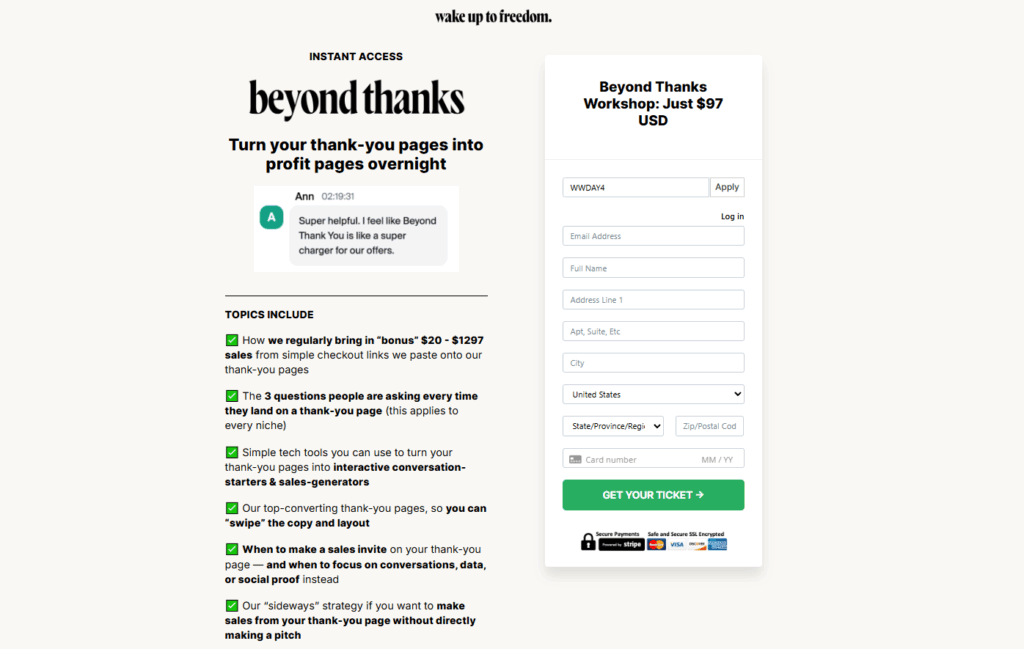
Executive Coaching Workshop Ideas
For other coaches:
- 360-Degree Feedback Training: Discover how to implement and interpret 360-degree feedback assessments to enhance executive development programs.
- Executive Presence Coaching Program: Practice coaching executives on cultivating presence, gravitas, and leadership charisma.
- Strategic Decision-Making Workshop: Explore frameworks and tools to help executives make sound strategic decisions and navigate complex challenges.
For individuals:
- Executive Presence Masterclass: Develop the gravitas, communication skills, and confidence needed to command respect in the boardroom.
- Strategic Thinking for Leaders Workshop: Learn proven frameworks to make better strategic decisions and lead your organization through complexity.
- C-Suite Leadership Intensive: Elevate your leadership capabilities with advanced strategies for managing stakeholders, driving change, and maximizing organizational impact.
Moxie Institute provides this executive presence workshop to help people become leaders who inspire action:
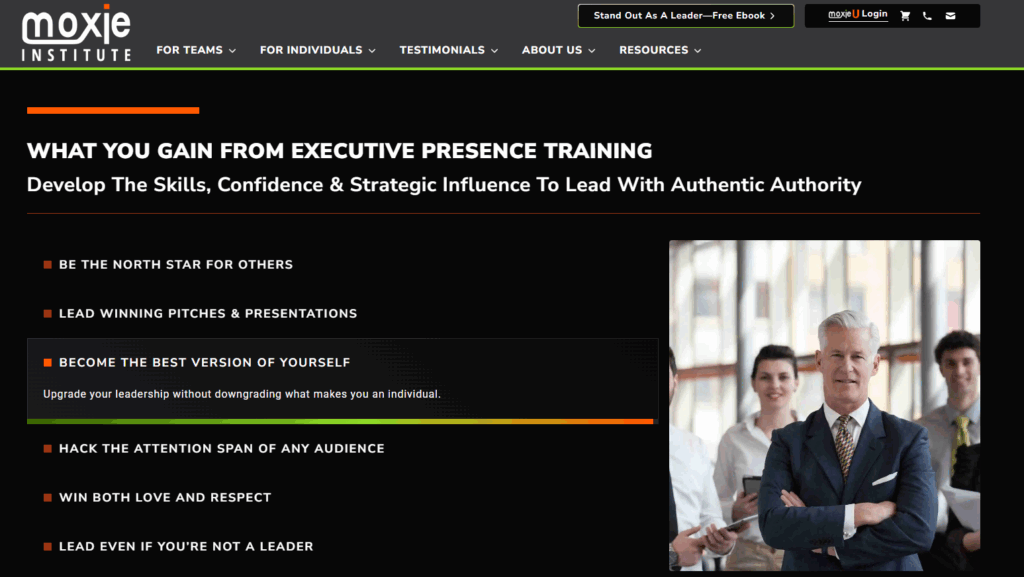
Leadership Coaching Workshop Ideas
For other coaches:
- Strengths-Based Leadership Seminar: Learn how to identify and leverage strengths in leaders for improved performance.
- Team Dynamics and Conflict Resolution Training: Learn coaching strategies that help leaders cultivate high-performing teams and manage conflicts.
- Authentic Leadership Development Retreat: Explore the principles of authentic leadership and how it can help leaders.
For individuals:
- Emerging Leaders Workshop: Build essential leadership skills including delegation, feedback delivery, and team motivation for new managers.
- Leading Through Change Intensive: Develop resilience and change management strategies to guide your team through organizational transitions.
- Authentic Leadership Retreat: Discover your leadership values, strengthen emotional intelligence, and learn to lead with authenticity and purpose.
McGill University teaches several leadership workshops for emerging leaders:
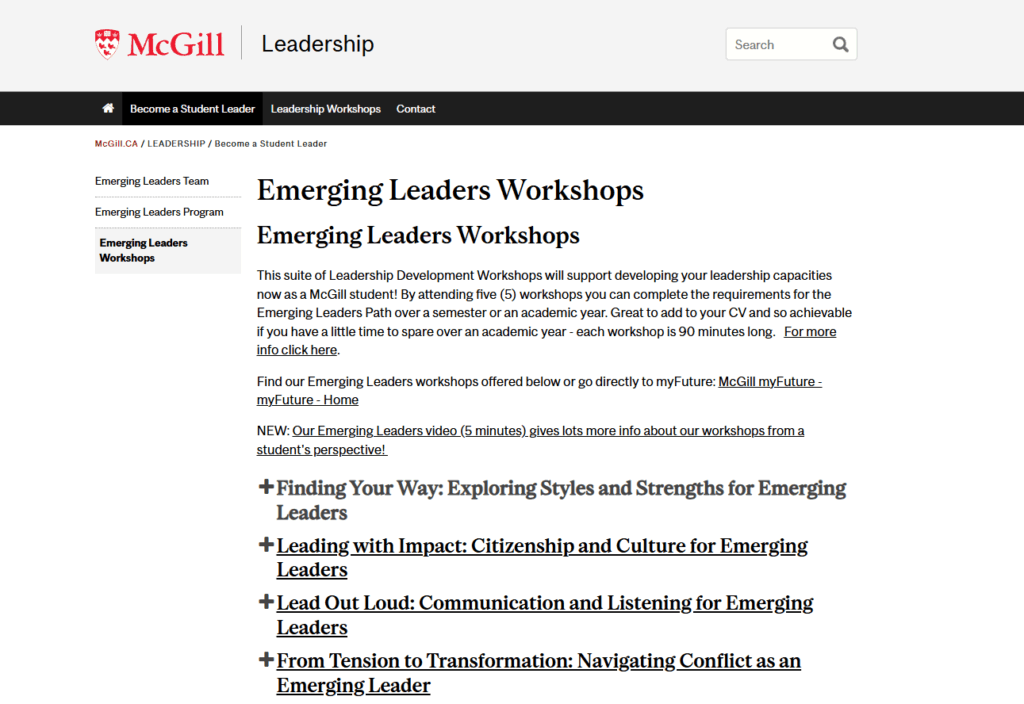
Relationship Coach Workshop Ideas
For other coaches:
- Couples Communication Coaching Certification: Learn effective communication strategies and conflict resolution techniques to help couples strengthen their connections.
- Relationship Renewal Facilitation Training: Discover how to facilitate transformative experiences and healing opportunities for couples seeking to reignite passion and intimacy.
- Attachment Theory in Coaching Workshop: Understand attachment styles and learn to help clients build healthier relationships based on their attachment patterns.
[ Read: 4 Top Relationship Coach Certifications + Free Alternatives ]
For individuals:
- Building Healthier Relationships Workshop: Learn practical techniques for emotion management, communication, and building stronger connections.
- Couples Communication Intensive: Master evidence-based communication tools and conflict resolution strategies to deepen intimacy with your partner.
- Relationship Renewal Retreat: Participate in a transformative weekend experience designed to help you and your partner reconnect, heal, and reignite your relationship.
Health Coach Workshop Ideas
For other coaches:
- Behavior Change Coaching Strategies Workshop: Learn evidence-based techniques and motivational interviewing skills to facilitate sustainable behavior changes in health clients.
- Holistic Nutrition Coaching Program: Explore integrative nutrition, lifestyle medicine, and self-care approaches that support optimal health outcomes.
- Stress Management Coaching Certification: Practice coaching methodologies for helping clients manage stress, build resilience, and support overall well-being.
For individuals:
- Habit Transformation Workshop: Create lasting healthy habits using proven behavior change strategies and personalized accountability systems.
- Holistic Wellness Reset Intensive: Design a comprehensive wellness plan addressing nutrition, movement, sleep, and stress for optimal health.
- Stress Less, Live More Workshop: Learn practical stress management techniques, mindfulness practices, and resilience-building strategies for everyday life.
Spiritual Coaching Workshop Ideas
For other coaches:
- Guided Visualization and Meditation Facilitation Training: Learn how to guide clients through transformative visualization and meditation experiences that support spiritual growth.
- Sacred Rituals and Ceremony in Coaching Workshop: Discover how to incorporate sacred rituals, ceremonies, and practices into coaching sessions ethically and effectively.
- Spiritual Coaching Methodology Intensive: Explore frameworks for helping clients deepen their spiritual practice while maintaining professional coaching boundaries.
For individuals:
- Meditation and Mindfulness Immersion: Develop a sustainable daily meditation practice and learn visualization techniques for personal transformation.
- Soulful Living Retreat: Participate in an immersive retreat experience focused on self-discovery, spiritual growth, and connecting with your authentic self.
- Sacred Life Design Workshop: Learn to incorporate meaningful rituals, ceremonies, and spiritual practices into your daily life for deeper purpose and fulfillment.
How to Promote Your Coaching Workshop
Here are a few ways to get the word out about your coaching workshop.
Position Your Event
To stand out from the crowd, you’ll need to carefully position your event:
- First, define the specific target audience for your event. Consider their biggest problem and how your workshop will help them solve it.
- Next, lay out your workshop’s key value proposition and learning outcomes. Highlight its benefits through the specific skills, knowledge, and tangible takeaways participants will gain by attending your event. Also specify how their career and life might change due to that.
- Then, turn these key selling points into a convincing title and description. Your title should be attention-grabbing and concise, using emotionally evocative language that inspires curiosity. Brainstorm a few versions and then shortlist the ones that resonate with you.
Lay out the detailed agenda of the event, describe the methodology behind it, and update your professional biography. You can use this material for your coaching website and promotional materials, and create short summaries of them for your social media posts and ads.
Create Your Workshop Signup Page
People will need a way to register for your workshop. If it’s paid, you’ll need to process their payment.
You can set up a coaching package inside Paperbell to manage all of that at once:
- Create your free Paperbell account if you don’t have one already.
- Go to Packages, click Add New, and choose One-Time or Payment Plan (or Free Package if your workshop is free).
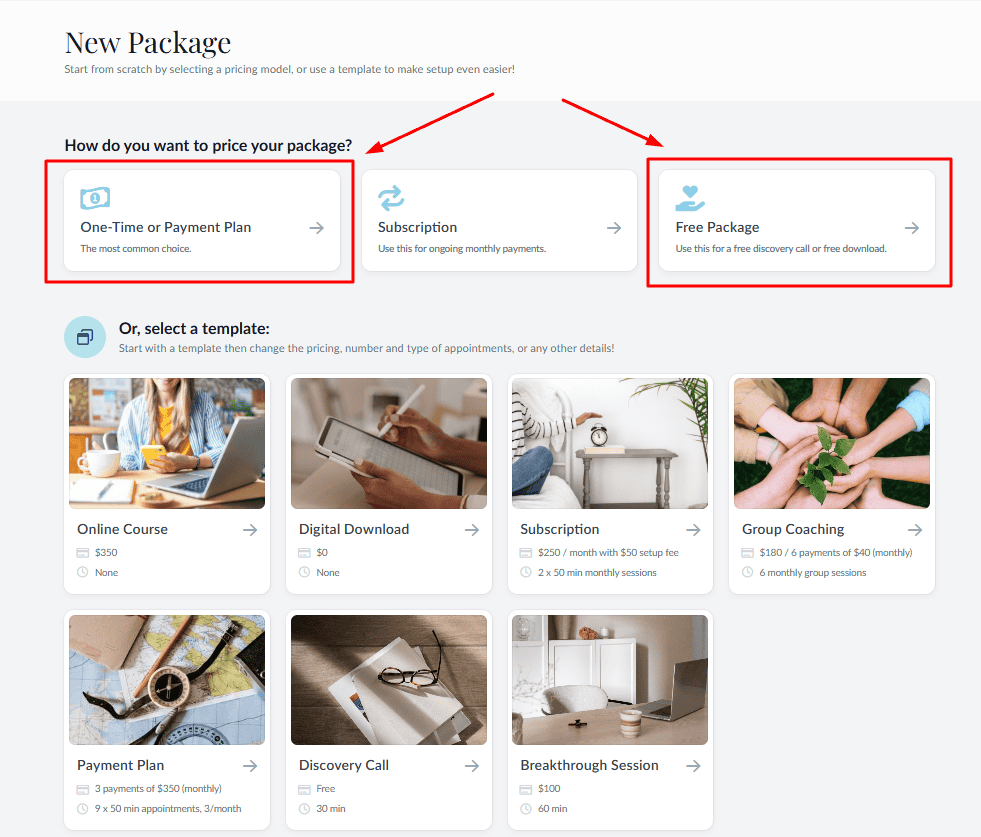
- Add the details of your workshop in the Landing Page tab of the package editing page.
- In the Purchase Options and Pricing tab, set a price option. You can set up more than one option if you want to give more flexibility to attendees.
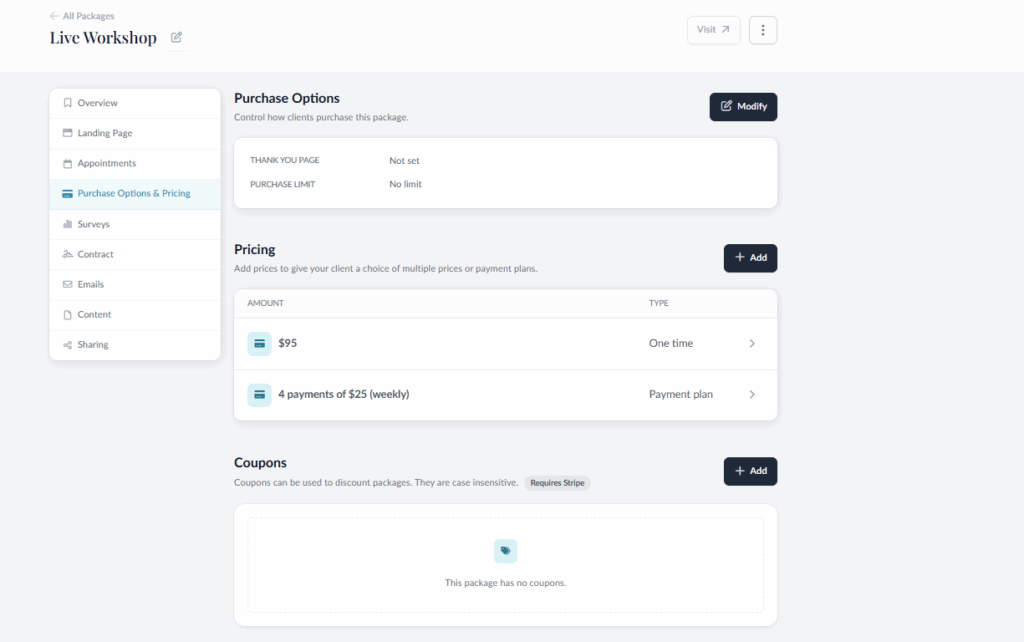
- Navigate to the Appointments tab. Because this is a workshop, you’ll want to add a Group Session. Modify the date, time, and duration of your workshop. If it’s not a standalone workshop, you can add additional sessions here, not just one.
- If you’re selling a workshop REPLAY and not a live workshop, you can add your replay file in the Content tab of your package.
- Optional: Set up automated email reminders so that attendees don’t forget about your workshop. You can do this in the Emails tab.
That’s it! Once you’re done, you’ll have a beautiful landing page to share during your promo campaign.
Interested attendees will be able to read all the info, pay, and receive their calendar invite for the workshop. All without you having to lift a finger.
Build an Online Campaign
Engage on social media platforms where your target audience spends most of their time. These include coaching-related Facebook groups, your Instagram broadcast channel, or LinkedIn. Plan a content calendar of various types of posts to share key information about your workshop and a call to action for registration, for example:
- Photography from your previous workshops
- Testimonials from your clients and coaching course students you helped with similar problems
- Sneak peeks into the key concepts of your workshop
- Live videos where you give a taste of your workshop content and pitch your event
- Ask Me Anything (AMA) sessions where you can answer questions and handle objections
- Behind-the-scenes posts about preparing for your event
Make sure you plan, produce (or outsource), and schedule your posts in advance. This will give you the time and energy to execute your campaign the best way possible.
Tap Into Your Network
Reach out to your existing professional network, like your clients and the students of your coaching courses, who might be a fit for your workshop. Ask your close circle within the industry to share your posts and refer participants to you.
Don’t forget to leverage your email list and the warmest leads in your sales funnel whom you regularly engage with. If you’re a part of an organization like the International Coaching Federation (ICF), you can also contact members to ask for referrals.
Seek out Collaborations
Consider partnering with other businesses, professionals, and influencers in your niche to leverage their network. Depending on their profile, you can bring them on board as facilitators, offer them a free ticket, or sign affiliate deals with them.
You can also submit guest posts to relevant blogs and publications or seek opportunities to appear in interviews and podcasts related to your upcoming event. If your workshop is offline, you can also place print-outs in local coworking spaces and other communities your audience visits.
Incorporate Marketing Tactics
Here are some common marketing tactics to help you create interest for your workshop:
- Urgency: Encourage sign-ups by offering early bird rates or exclusive bonuses for participants who register before a certain date.
- Scarcity: Limit your workshop to a few participants to motivate people to secure their spot.
- Social proof: Leverage testimonials from clients and collaborators about your past events or services.
- Exclusivity: Optionally, create an application process for your workshop to select top professionals in the industry and boost your event’s networking value.
The important thing is that you stay consistent with these strategies. Don’t announce something and later compromise on it because of a low sign-up rate.
Instead, pick one strategy you can stick to throughout your campaign.
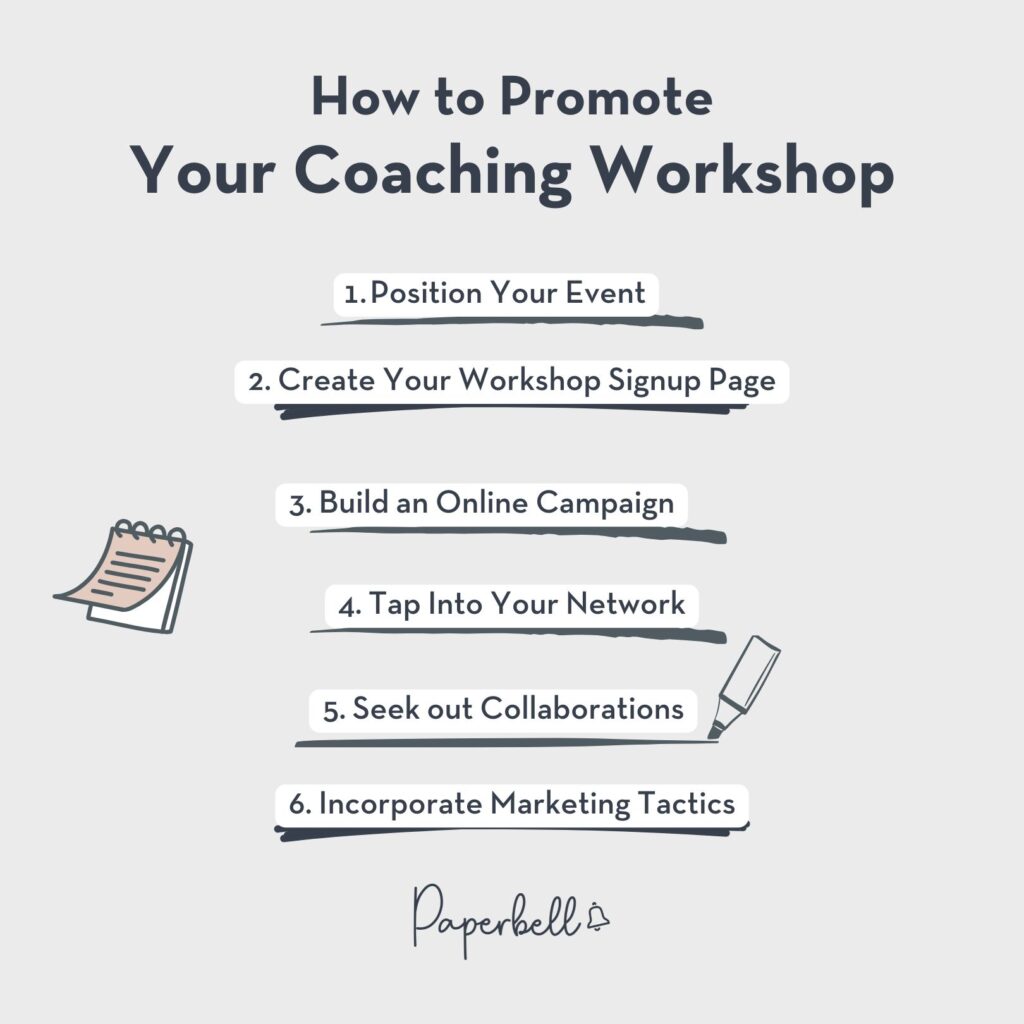
Build the Coaching Practice of Your Dreams
Coaching workshops are one of the best ways to share your expertise and broaden your audience. Building your brand is key to your professional development, but it’s just as important that things work well behind the scenes of your coaching practice.
Paperbell will make sure they do.
It’s an all-in-one client management tool specifically designed for coaches by coaches. It handles your contracts, schedule, payments, landing pages, and more.
Try Paperbell for free to start promoting your next coaching workshop.

Editor’s Note: This post was originally published in March 2024 and has since been updated for accuracy.









